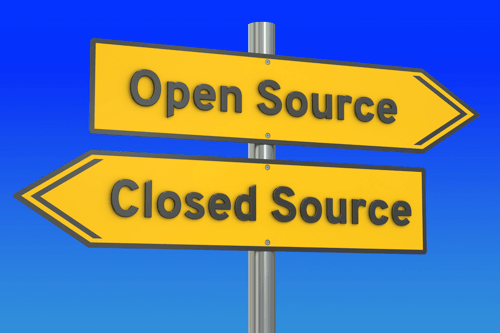
Open Source Database Management Systems are on the rise. Not only among newtech companies, but now also in banks, government departments and multinationals. Recent research among CIOs has shown that more than 60 percent want to drastically reduce licensing costs. Opting for more open source software helps, if well-considered choices are made. The most important points to consider are shown below.
1. Choose wisely
By definition, licensed software costs more than Open Source software. It seems attractive to switch completely to an open source DBMS such as MySQL or PostgreSQL. Yet that is not recommended for just any application.
Software that has been developed under license is often well supported by the publisher. If a problem arises unexpectedly, it can often be addressed quickly, and that is what you pay for. Certainly in business-critical applications, reliability is a major asset. Our advice is therefore to make a conscious choice with regard to the applications that may or may not benefit from an Open Source DBMS.
2. Act now
According to some, data is the new gold. There is no doubt that there is an unprecedented data revolution happening right now. More and more organizations are actively using data in all aspects of business operations. From sales to optimization and from logistics to planning.
The environments in which data is collected and analyzed are now being built. At this stage it is relatively easy to start with an Open Source database solution, such as Postgres or MongoDB. This offers the opportunity to learn a lot and experiment with an important, fast-growing, but not yet business-critical application. Moreover, these environments will likely grow very fast and will therefore become very expensive in terms of licensing costs, which is another important reason for choosing Open Source from the start.
3. Choose the community
When choosing Open Source software, it is important to also know and understand the background of the Open Source world. It is a fundamentally different approach than the market for commercial software, which is developed exclusively for profit. Open Source has a completely different dynamic and is fully developed and managed by a community of passionate developers.
If you choose Open Source, it is important to embrace this philosophy and to choose a community you can be a part of. This means that you can contribute by, for example, letting your own people participate in the development of the Open Source software and DMBS that you use, by supporting and organizing meetups, by giving training and by visiting international events.
4. Choose the right people
One of the biggest obstacles for Open Source at the moment is the lack of experienced people. Many companies that want to switch to Open Source place an ad for a PostgreSQL specialist, for example, only to find out that there are hardly any suitable candidates. Many of the current experts are self-taughtand have gathered their knowledge because they have been active for years in the management and development of Open Source databases. It is still a relatively small community of people and it is therefore all the more important that you select the right parties and right people at the start. These are by definition active in the community and have already earned their spurs in the specific open source DBMS.
With the current rapid growth of Open Source DBMS it is becoming increasingly important to provide training that can efficiently and effectively teach larger numbers of people. OptimaData, for example, actively participates in the development and delivery of training courses, workshops and meetups.
Do you have questions about applying Open Source database management systems in your company? Or would you like to know how OptimaData can contribute to this? Then please contact us for more information.
Further reading:

